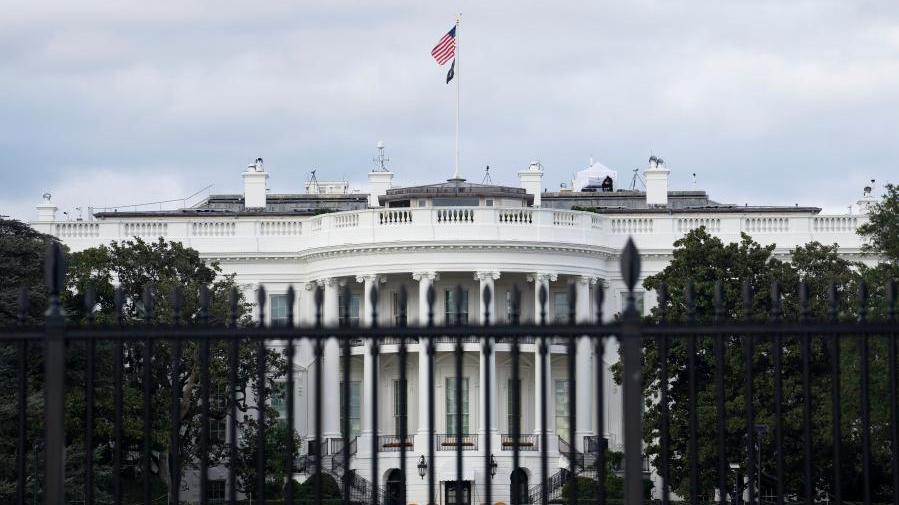
The White House in Washington, D.C., U.S. [Photo/Xinhua]
By Yuan Sha
Samuel Paparo, the new head of the U.S. Indo-Pacific Command, recently told a Washington Post reporter that the U.S. military intends to "deploy thousands of unmanned submarines, unmanned surface ships and aerial drones" as soon as Chinese forces start moving across the 100-mile waterway that separates the Chinese mainland and the Taiwan region, a plan Paparo calls "Hellscape." It demonstrated that Washington is stepping up the "porcupine strategy" on Taiwan, aimed at preventing the peaceful reunification of China by turning the island into a fully-armed and provocative "porcupine."
The U.S. 'porcupine strategy' on Taiwan
It's not the first time that the U.S. has made threats against China regarding the Taiwan question, and these threats have been more than rhetorical. The Biden administration has made more frequent, large-scale and high-profile arm sales to Taiwan. The U.S. National Defense Authorization Act of 2024 expedited arming the island by adopting the Taiwan Enhanced Resilience Act. In fact, arms sales to Taiwan have garnered bipartisan support. Recently, the U.S. House Appropriations Committee released a National Defense Authorization Bill for Fiscal Year 2025, which intends to further allocate $200 million for Taiwan's "international security cooperation programs" and "prioritizing defense articles and services to Taiwan." There are also reports that the Pentagon has set up a secret task force dedicated to speeding up arms sales to Taiwan.
President Biden has also repeatedly made hawkish statements on the Taiwan question, alluding to military assistance to Taiwan. In a recent interview with Time magazine, he said that he would not "rule out using U.S. military force" to defend Taiwan, and added,"it would depend on the circumstances." Biden also succeeded in securing the roughly $95 billion supplemental aid package for Taiwan, together with Ukraine and Israel.
U.S. calculations
Why is the United States so intent on arms sales to Taiwan amid intensified conflicts elsewhere in the world? Geopolitical and geoeconomic motivations are at play here.
Geopolitically, it is part of the U.S. containment or euphemistically-termed "strategic competition" against China in the military realm. The United States has long viewed Taiwan as a crucial choke point along the "first island chain" against China to maintain the U.S. hegemony in the Aisa-Pacific region. The Biden administration also made Taiwan a key security partner in its "Indo-Pacific strategy." The United States is also playing the scare tactic by fanning the "Chinese military threat" and more recently the "Chinese shipbuilding threat," with an aim to justify its military balance of power effort to the region.
Geoeconomically, Taiwan has become a lucrative market for the U.S. arms industry. The U.S. military-industrial complex has reaped huge profits from regional tensions in Europe and the Middle East, and it might want to replicate the business in the Asia Pacific. A large delegation of 27 U.S. defense contractors arrived in Taipei last week to attend the "U.S.-Taiwan Defense Industry Forum." Many of these contractors are already under sanctions by the Chinese government due to their violation of the one-China principle and the three China-U.S. joint Communiques. But money politics clearly trumps good faith and encourages hawkish policies toward China.
Regional implications
As Chinese Defense Minister Admiral Dong Jun reiterated at the Shangri-La Dialogue earlier this month that Taiwan is part of China, and warned that "anyone who dares to separate Taiwan from China will only end up in self-destruction." The U.S. "porcupine strategy" driven on Taiwan would only bring disasters to the Taiwan Straits and the region.
First of all, the United States seems to be hollowing out its "longstanding commitment to the one-China policy" and changing the status quo across the Taiwan Straits. Many fear that the U.S. is considering changing its "strategic ambiguity" on Taiwan, which would encourage imprudent moves of Taiwan separatists and destabilize the region.
Second, the United States attempts to turn Taiwan into a big arsenal at the peril of the lives and livelihoods of the Taiwan people. The U.S. promise is untenable and risky. Almost all war games by the U.S. think tanks show the U.S. would lose badly in a contest over Taiwan. In fact, the U.S. global arms sales delivery is under serious strain. According to the Cato Institute, the U.S. is behind as much as $19.7 billion in arms sales to Taiwan.
Worsening cross-Strait relations would also hurt the economic interaction between the Chinese mainland and the Taiwan region, the suspension of the Economic Cooperation Framework Agreement due to heightened tensions is the latest case in point.
Last but not least, the U.S. "porcupine strategy" jeopardizes the long-lasting peace in Asia since the end of the Cold War. People in Asia are committed to pursuing peace and prosperity and would prefer to solve problems in their own way. By sending arms to Taiwan, the United States is fanning arms races and security dilemmas and would invite opposition from the region.
Yuan Sha, a special commentator on current affairs for CGTN, is an associate research fellow at the Department for Asia-Pacific Studies, China Institute of International Studies.

 中文
中文



